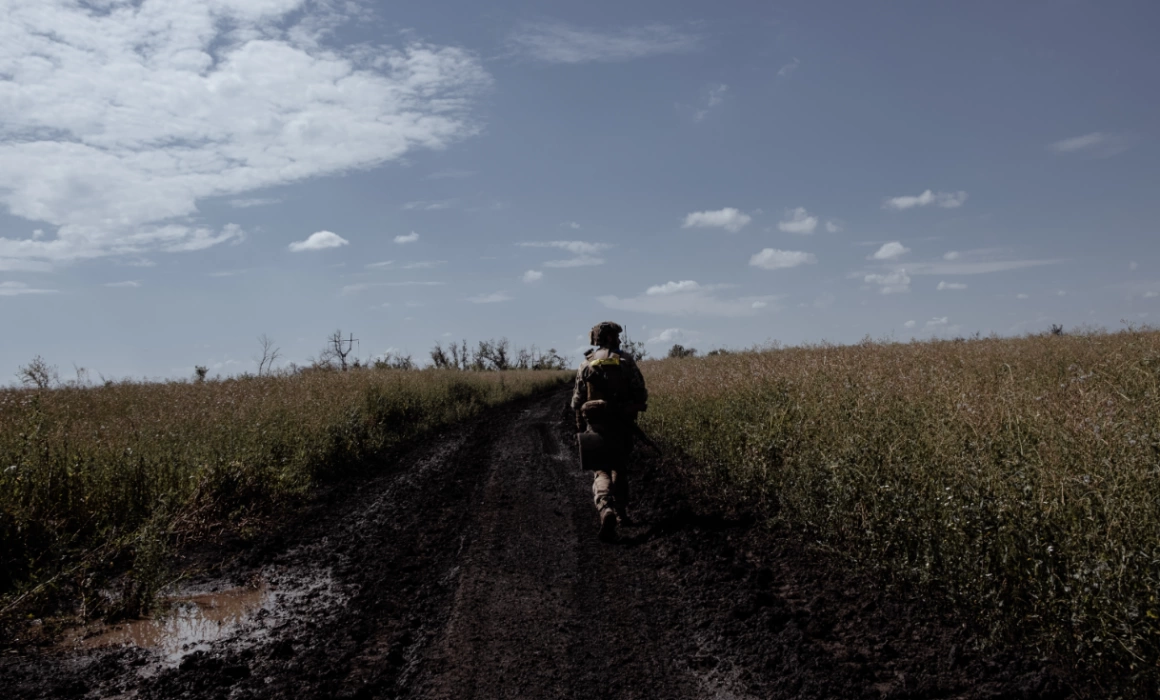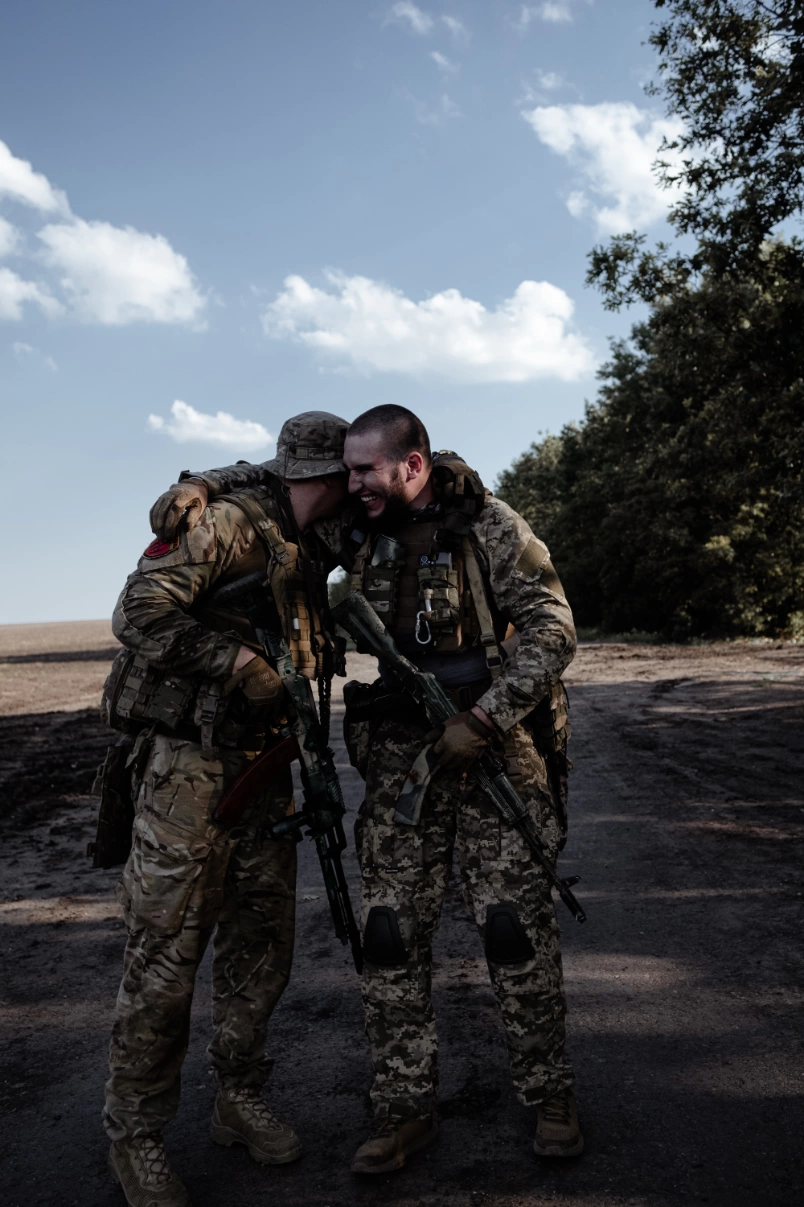In memory of Sergey Ilnitsky
There is a lake 20 kilometers from the front. We lie on the water – me and the soldiers. We are looking at the sky. Above us are clouds and the green hills of Donbass. I swim to my new friend and touch him with my hand – he is only 22 years old, he has been on the front for a year. On the very front line, closest to the enemy, a young boy in the infantry. Hands with shrapnel scars, several contusions in the head. He is from the small town of Rakhiv in the Carpathian Mountains, far from the war.
Bogdan went to war as a volunteer, it was his decision. He loves Ukraine and wants to protect it.
“When the war started in 2014, I didn’t think much about it.”
“But you were a child then.”
“I know. That's why I'm at war now.”
The war between Russia and Ukraine began in 2014 - in March, Russia annexed Crimea, and later, in April, the first battles began for the city of Slovyansk, located in the Donbas. For the first few months of the war, Russia supplied heavy weapons to the separatists, and already in July, the regular Russian army took part in the war against Ukraine.
We dive under the water, and then bask in the sun, dry and come back.
I met Bogdan last night. I filmed the military exercises of the Ukrainian Volunteer Army at the training ground, and all the soldiers wanted a photo, except for Bogdan. He was hiding from the camera, he was shy. But I found the right words for him, and he opened up. He smiled, looked into the lens, the sun at sunset softly illuminated his face. Bogdan was not like all the other soldiers – he kept aloof. He told me that when he came to the company there were more than seventy people. I looked around. There were about 25 soldiers nearby. "Everyone you see is what's left." After the training ground, we returned to the village where the soldiers live. Bogdan invited me to visit him – I agreed.
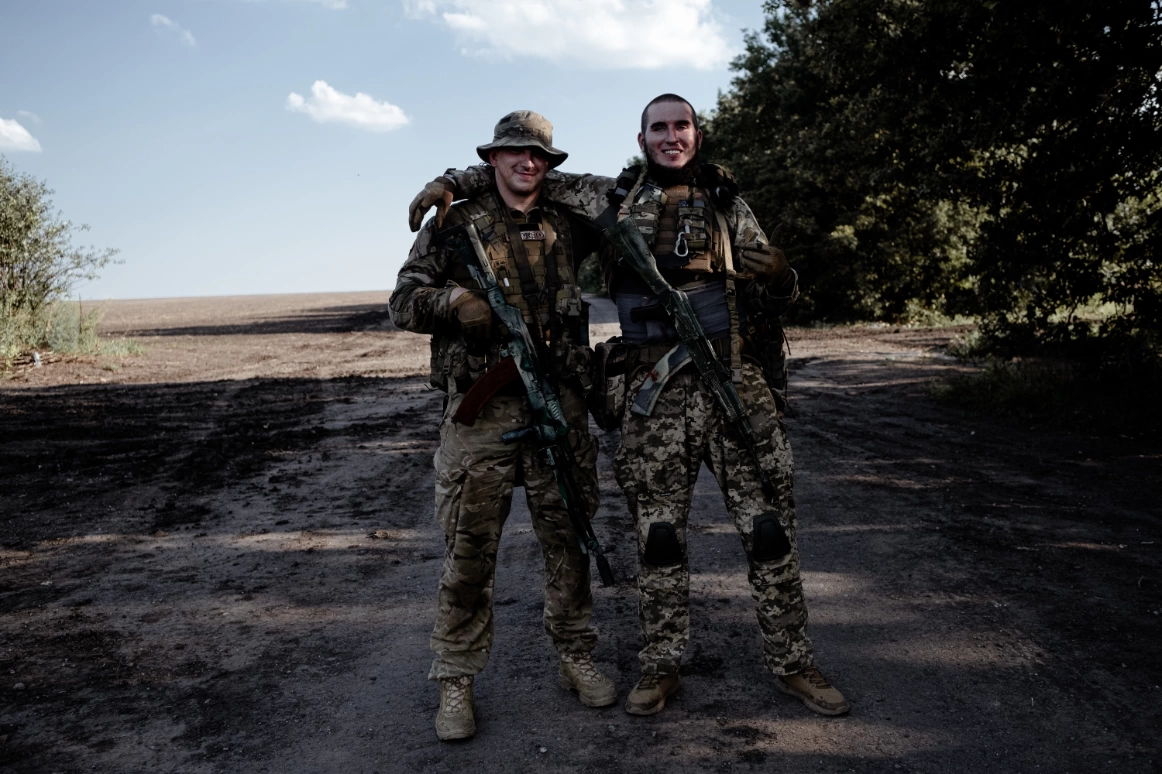
For several hours, we talked about the war. This young guy has seen more than many people have in their lifetime – he has seen a lot of death and pain. And he kept his kind, almost childlike smile. When he closed his eyes and lowered his head, as if lost in his thoughts, I put my fingers on his scars, and wanted to take them onto myself, all the pain that he experienced when the red-hot iron flew into him – into a pure, kind, beautiful child. It cut into his skin and stayed there.
We talked about love, about the mountains in which he grew up, and about music. It was dark outside. That evening he was told that the next day he needed to enter the position ahead of time. He was supposed to have a few more days off, but they were taken away from him. His mood changed. I didn't know how to help him. We agreed to meet again tomorrow, before he left. As he escorted us to the car, the sky was lit up with the bright Milky Way. We hugged each other tightly. I promised that I would visit him again.
And I arrived the next day, and there was a lake, and a dusty road, and wet clothes, and boiled corn. In the evening he would go to a position near Bakhmut and spend three days there.
Bakhmut is a Ukrainian city, which was heavily fought over, for an entire year. At first, Bakhmut was of strategic importance at the front - the Russian army wanted to occupy it, in order to advance to other sectors of the front. But having failed on the northern flank, its strategic value ceased to make sense for the Russians. However, they continued to fight for its symbolic meaning. The battle for Bakhmut was the most brutal one on Ukrainian territory since World War II.
Now nothing remains of the city, only its name. At war, holding positions is easier than going on the offensive, so after the Ukrainian soldiers left the city, they gained a more advantageous position.
Every day I will wait for a message from him. In the trenches, he will receive another shell shock, several of his friends will be injured, one of them will have a severe leg injury. But for now, we're driving down a dusty summer road in a car with the windows open.
“Don't go down this path and watch your step”
At high speed, we are driving down the road - we cannot stop. The car is driving through open country close to the front, and Russian drones can easily target us. Zhenya, with the call sign “Pilot”, is driving. He does not slow down when he says that there are about 12 bodies of Russians in the bushes next to the road. They have been lying there since the Ukrainian soldiers recaptured the positions. The Russians simply threw the bodies of their soldiers into a pile and retreated. We drive by.
We stop at the edge of the field. We camouflage the car under a tree, covering it in branches. We wait for a few minutes and listen. The pilot gives us instructions – to walk away, spaced twenty meters from each other, and to go quickly. The distance is needed because if one person comes under fire, then the others still have a chance to remain intact. If we come under fire, we must immediately fall to the ground, face down.
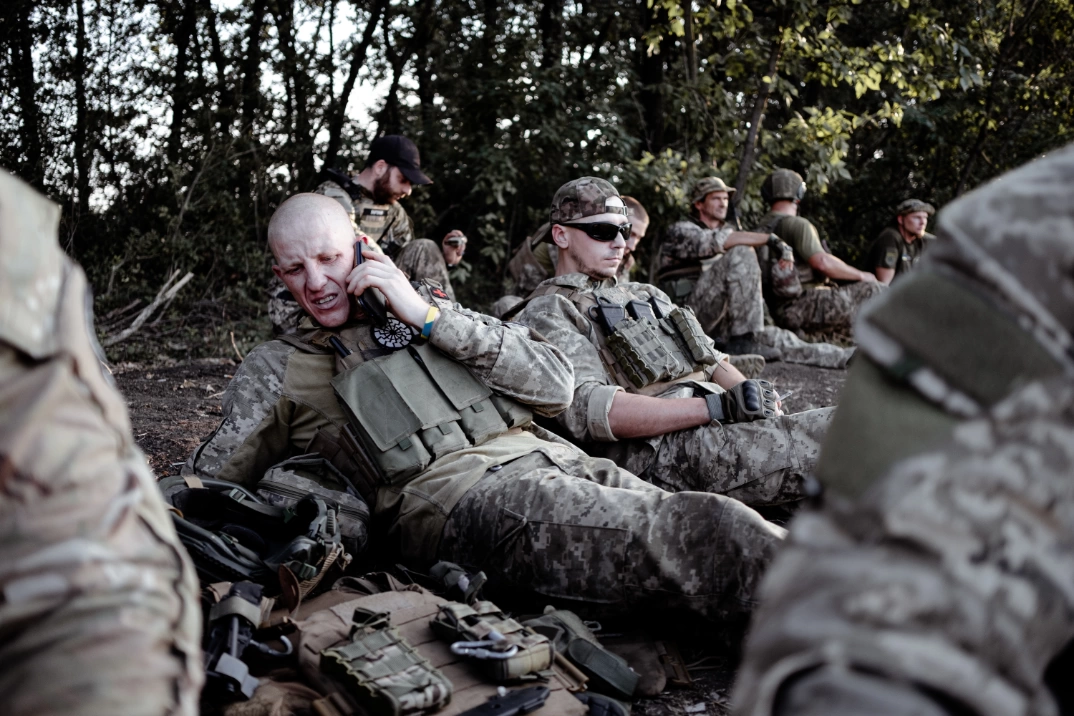
The August afternoon sun is scorching. Walking in a bulletproof vest, a helmet, and carrying the necessary things with you is a test. Soldiers go through this every day. Once an ordinary field, where people worked for the harvest, it is now mined and overgrown with tall grass. We're moving fast, with the Pilot's silhouette ahead. He carries four pizzas for the military to the position. We often hear whistles in the sky. These are shells flying – flying in both directions.
Tactical Team Adam in this position works with FPV drones. The person who controls the drone puts on special glasses and sees the flight in real time. His task is to drop explosives on the target.
“A drone can cost a few hundred dollars, but it can destroy the equipment of the Russians, which is worth millions,” Pilot says.
The military arrive at the position for the day. They will stay here from early morning until late evening. Fortunately, this particular team manages to return to their location for the night.
In the trench, we eat pizza, smoke, and talk. The former life of every military man has been put on pause - they can no longer be among loved ones, do what they love, or see how their children grow up. Russia brought the war that took away their hometowns, the lives of their friends, their time, health, youth.
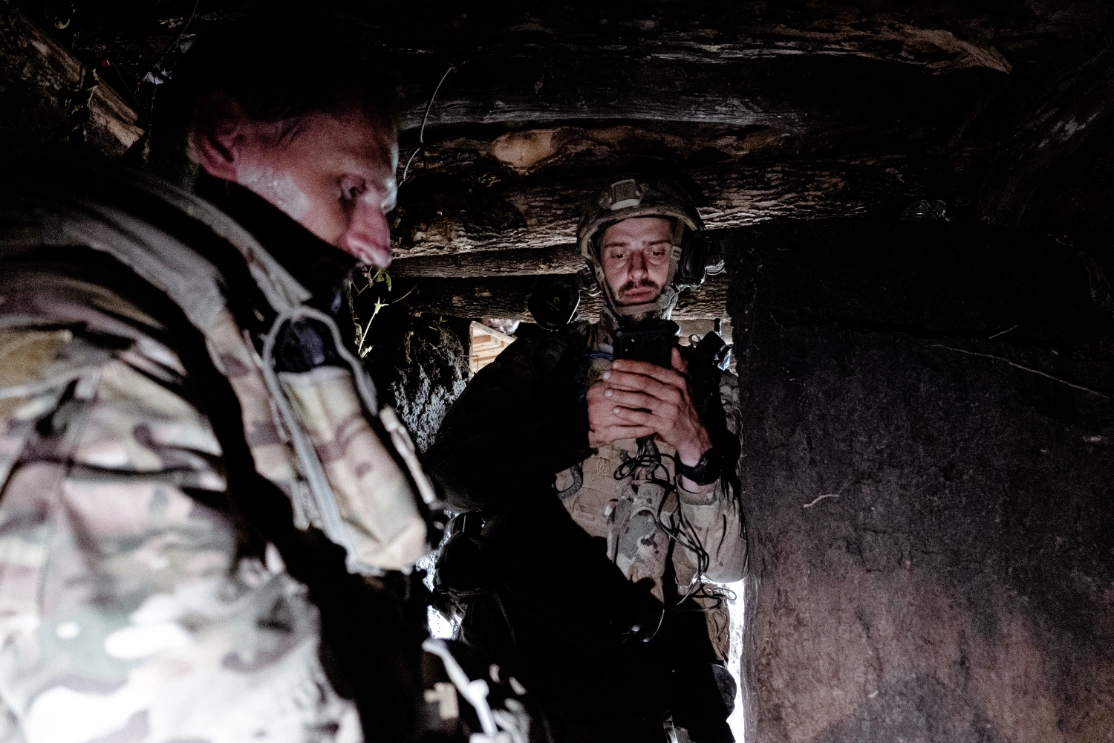
Soon, the whistle of the shells sounds louder – we leave for the dugout. Yegor, one of the soldiers, says they are trying to hit us. The explosions sound pretty close. We are protected by a fortification dug into the ground. But nothing will protect against a direct hit – you always need to be prepared for this. The earth in the dugout is wet from the recent rain. Mice run through the trenches.
Later, the target is reported on the radio – the drone is loaded with explosives, Yegor puts on his glasses and starts control. He is directed, corrected, and he hits the target. I ask what was the largest Russian target they managed to neutralize. A tank, Yegor says, a very big, serious goal.
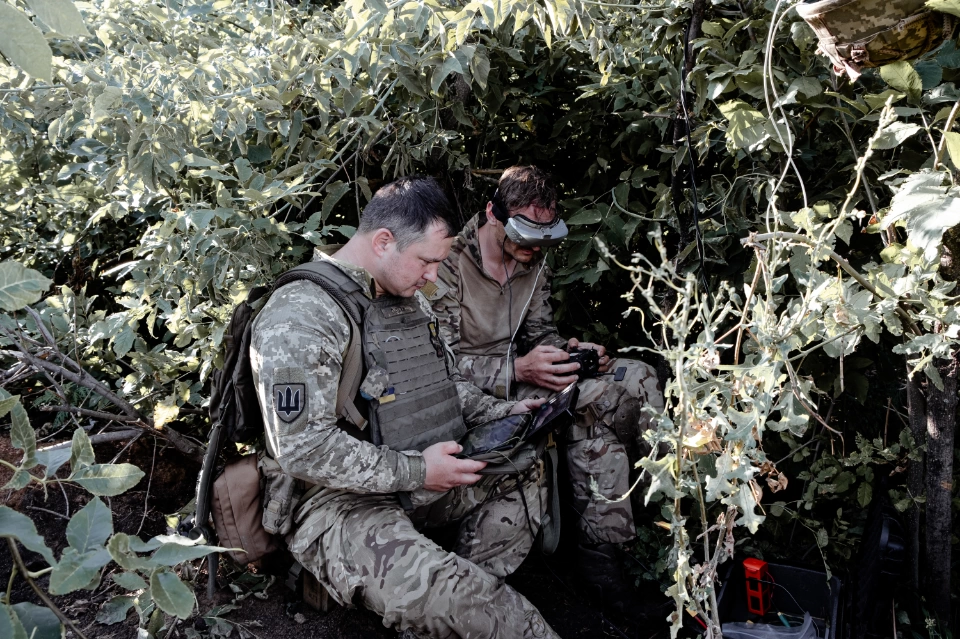
After the earlier success, they open fire on us again. We descend into the dugout again. The conversations are casual, calm, which makes it even weirder to be under fire.
On the way back, we find new explosion craters. Some are very close to the position. The pilot says that we will take a shortcut through the field, but we must go step by step and stay on the path. Part of the road is mined, and you can die from a wrong step. Fortunately, everything works out.
“We hold on to the fact that we are volunteers”
Sergey Ilnitsky, commander of the Ukrainian Volunteer Army, meets us at his temporary home in a small village in the Donetsk region. At first he appears stern, keeps his distance, and answers questions with restraint. But soon, kindness and warmth replace his seriousness.
He has been fighting since 2014. People who have gone through this path seem immortal. Sergey is a colonel who fights alongside his soldiers. According to him, the main motivation that helps Ukrainian soldiers stay in the war is the desire to protect their home.
“I won't let you work for the position, don't even ask me about it”, he tells me. “It's too dangerous. If you want, we can go to the training ground, the guys are just training now.”
We decide to go to the training ground, where I will later meet Bogdan. When his soldiers train and when they rest, he looks at them with paternal kindness. We spend several hours at the training ground, and, when we return, Sergey allows me to ride in the back of a car with the rest of the soldiers. He told me to hold on tight.
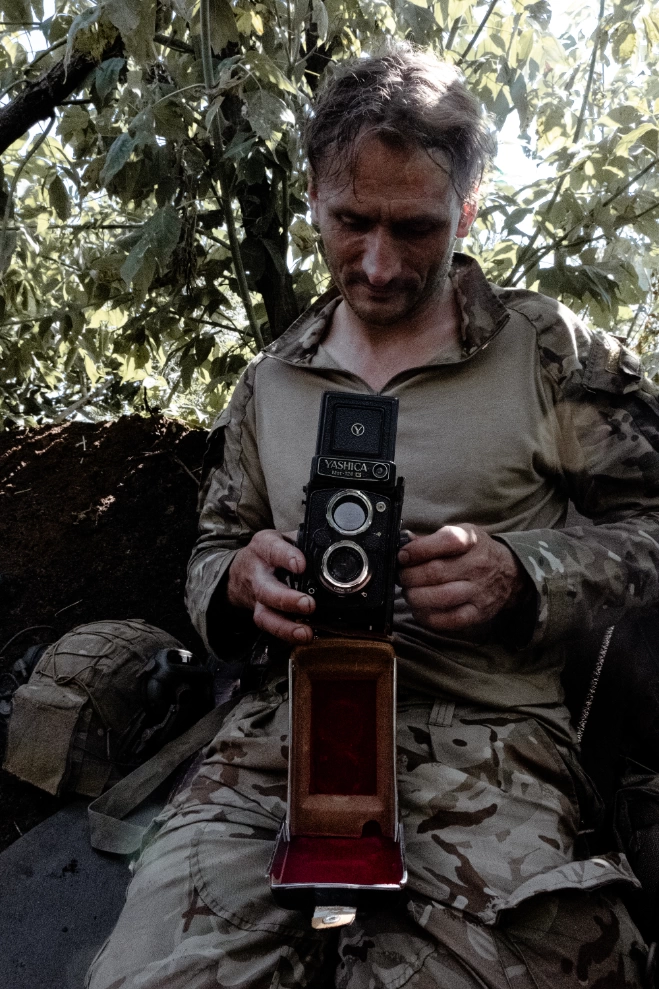
When we returned to their village, Sergey went about his work - writing messages and answering calls. The soldiers and I talked and laughed, and Sergey hissed at us, as if we were children who were too spoiled. It was kind and caring.
Two weeks later, we learned that Sergey had died. He went into position, and there he died from his wounds. That terrible feeling of emptiness and pain when a beautiful person dies. He liked my medium format film camera and took a portrait of me. Later, I developed the film and saw myself through the eyes of a man who is no longer with us.
After the pain of realizing the death of a person comes anxiety for those who are alive. If the most experienced perish, then what awaits the young? There is no answer here, there is only pain.
The Romanian version of this article is available here.
